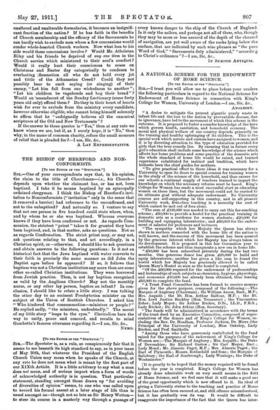THE BISHOP OF HEREFORD AND NON- CONFORMISTS.
[TO THE EDrrOS Or THE " SPECTATOR."] Sin,,—One of your correspondents says that, in his opinion, the claim to the title of Churchman—i.e., his Church— depends upon whether the claimant has, or has not, been baptized. I take it he means baptized by an episcopally ordained clergyman. I think the Bishop of Hereford's invi- tation to Nonconformists ("invitation" only in the sense that it removed a barrier) had reference to the unconfirmed, and not to the unbaptized P And naturally so. I venture to say that not one person in five hundred could state where, when, and by whom he or she was baptised. Whereas everyone knows if they have been confirmed or not. As regards Com- munion, the strictest "priest" takes it for granted they have been baptized, and, in that matter, asks no questions. Not so as regards Confirmation. The strict priest may, or may not, ask questions relating to that, and act accordingly, in a Christian spirit, or—otherwise. I should like to ask questions and obtain answers to the following questions ; Is it not an historical fact that the Jews baptised with water converts to their faith in precisely the same manner as did John the Baptist ages before he appeared ? If so, it follows that baptism was not a Christian institution any more than are some other so-called Christian institutions. They were borrowed from Jewish practice. Then, is not lay baptism recognised as valid by the .Anglican Church? May not the monthly nurse, or any other lay person, baptize an infant P In con- clusion, I should like to relate a little story. I was talking the other day to an eminent Presbyterian minister on the subject of the Union of Scottish Churches. I asked him " Who hindered that consummation—ministers or people ? " He replied sadly, " the ministers, undoubtedly." The moral of my little story "leaps to the eyes." Clericalism bars the way to unity, peace and concord, and recalls to mind Gambetta's famous utterance regarding it.—I am, Sir, &c.,
NEMO.










































 Previous page
Previous page